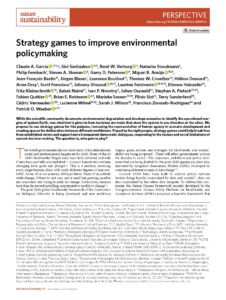
Abstract: While the scientific community documents environmental degradation and develops scenarios to identify the operational margins of system Earth, less attention is given to how decisions are made that steer the system in one direction or the other. We propose to use strategy games for this purpose, increasing the representation of human agency in scenario development and creating spaces for deliberation between different worldviews. Played by the right people, strategy games could help break free from established norms and support more transparent democratic dialogues, responding to the human and social limitations of current decision-making. The question is, who gets to play?
Consultez la notice complète de l’article sur ORBi
